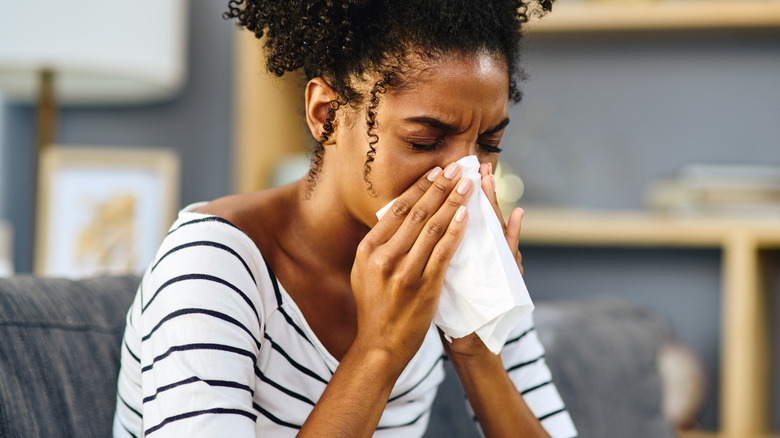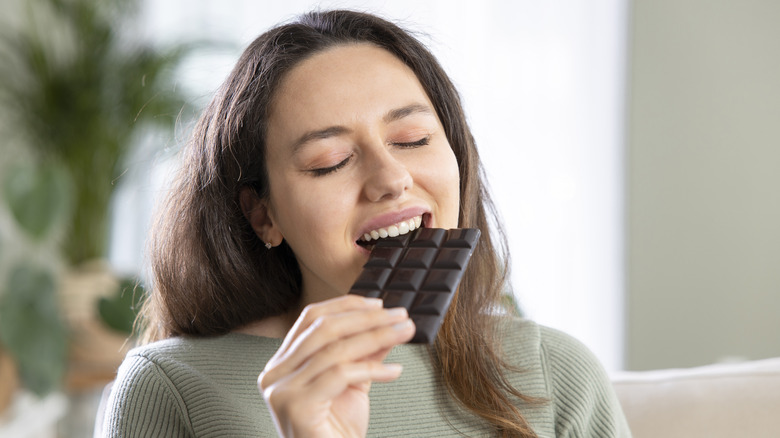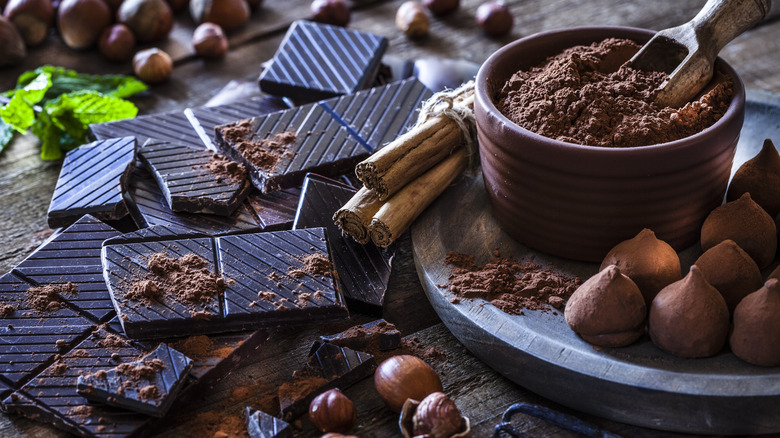What It Means When Eating Chocolate Makes You Sneeze
Dark chocolate can be so decadent. Just a small bite of dark chocolate sends your taste buds on a rich journey as you experience the slight bitterness of the natural cocoa with the sweetness of the added sugar. For some people, eating chocolate tickles the nose enough to make them sneeze.
The chocolate sneeze is similar to what makes people sneeze if they see a bright light or taste other strong flavors. Some people even sneeze when they're around someone they love, according to The Atlantic. Although it can be called an "orgasm of the face," the scientific term for these sensory reactions is a photic sneeze reflex. According to Daily Mail, these types of sneezes don't mean you're allergic to chocolate or bright lights (especially if you don't have other allergy symptoms). Instead, a chocolate-induced sneeze occurs when the trigeminal nerves in your eyes, nose, and jaw believe something is tickling your nose. Your brain then sends the message to sneeze to clear it away.
It's unclear what causes the photic sneeze reflex
Photic sneeze reflexes are possibly caused by some crosstalk between the trigeminal nerve and other nerves in the brain when we see bright light, according to Daily Mail. However, why we might have a sneeze as a reaction to food is a little more unclear. It's possible that theobromine, a compound found in chocolate that stimulates the nervous system, stimulates the vagus nerve. This could also trigger the trigeminal nerve to produce a sneeze. The flavonoids in chocolate could also prompt the production of nitric oxide, which opens the small blood vessels in your nose. This sudden rush of blood in the nasal cavity could signal to the body that there's something tickling your nose, causing a sneeze.
Why do some people sneeze after these triggers and some don't? According to Vox, it's possible that the trigeminal nerve and these other nerves sit a little closer together in some individuals, according to their genetics. Photic sneeze reflexes are genetic and can occur in up to 30% of people. A 2010 study in PLOS Genetics conducted by 23andMe surveyed 10,000 people and found that photic sneeze reflexes can be traced to specific genetic markers.
A chocolate sneeze could mean you're allergic to chocolate
Some people might sneeze after eating chocolate because they are allergic to one of the ingredients in chocolate. According to Medical News Today, you could be allergic to the cocoa in chocolate if you also get symptoms such as hives, stomach cramps, or a swollen tongue or lips. If you know you're allergic to milk, some chocolate also has milk and can also trigger an allergy. Milk allergies might have immediate symptoms after eating or drinking milk such as hives. But some symptoms might appear later such as coughing, loose stool, or mucus in the nose and lungs.
People with a sensitivity or intolerance to caffeine might experience a reaction, because some chocolate could have as much caffeine as half a cup of coffee. Caffeine sensitivity will show symptoms like irritability, trouble sleeping, headaches, or digestive issues. Some chocolates will have soy, tree nuts, or peanuts, so people with these allergies might experience an allergic reaction. Soy allergies could have similar symptoms as a cold. Other soy allergies might be felt as digestive issues, asthma, itchy skin, or brain fog.



